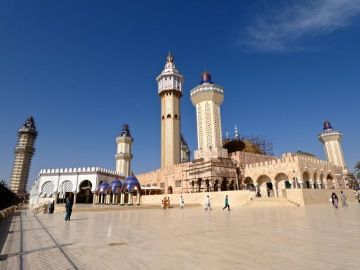Islam and Senegal
June 6, 2023

Senegal is a country where beliefs and traditions mix with modernity. Senegal's population is predominantly Muslim. Christians, particularly Catholics, are a minority, but they are respected and active in society. Traditional beliefs such as animism and Mahdism continue to exist and affect Senegalese religious practise.
Senegal is known for its religious tolerance, which is part of its cultural identity. Religious freedom is guaranteed by the Constitution and international treaties. Religious communities work together to support local communities and develop the country. It is not unusual to see Muslims and Christians celebrating holidays together, visiting shrines, or participating in charitable activities.
Religious tolerance in Senegal is the result of a long history of interaction and dialogue between different religious traditions. It is also a reflection of Senegalese values such as hospitality and solidarity. Religious tolerance in Senegal serves as an example for other countries facing religious conflicts, intolerance, or extremism.
Islam is the religion of the majority of the population of Senegal. According to estimates, Muslims make up about 95 % of the population, while Christians and animists are minorities. Islam reached the area in the 11th century through traders and missionaries from the Maghreb and Egypt. Since then, Islam has become an important part of Senegalese culture, politics, and society.
Islam is a monotheistic religion that believes in one God, Allah, and his prophet Muhammad. Islam emerged on the Arabian Peninsula in the seventh century and quickly expanded throughout the world. With over two billion adherents, Islam is now the world's second-largest religion.
Islam has five basic rules, which are called the Five Pillars of Islam. They are:
- Confession of Faith (Shahada): A Muslim must say the words: "There is no God but Allah, and Muhammad is His Messenger."
- Prayer (salat): A Muslim must pray five times a day towards Mecca, the holy city of Islam.
- Alms (zakat): A Muslim must give part of his wealth to the poor and needy.
- Fasting (sawm): A Muslim must abstain from eating, drinking, smoking, and having sex from dawn to dusk in the month of Ramadan.
- Pilgrimage (Hajj): A Muslim should visit Mecca at least once in his life and perform certain rituals there.
Islam is also based on the Koran, the holy book that contains the words of Allah revealed to Muhammad. The Koran is supplemented by the Sunnah, the tradition of the Prophet and his companions, which is recorded in the Hadith, collections of narrations about Muhammad's actions and sayings. Islam also has a legal system called Sharia, which governs the religious, social, and personal affairs of Muslims.
Islam is a religion of peace, justice, and compassion. Islam recognizes other Abrahamic religions such as Judaism and Christianity and respects their prophets and holy books. Islam also teaches the dignity and equality of all people regardless of race, gender, nationality, or creed.
Islam in Senegal plays an important role in shaping national identity and social values. Islam is associated with concepts such as solidarity, justice, peace, and humility. Islam also promotes education, art, and culture. In Senegal, we can find many Islamic schools, universities, libraries, museums, and monuments. Islam is also a source of inspiration for Senegalese literature, music, poetry, and architecture.
